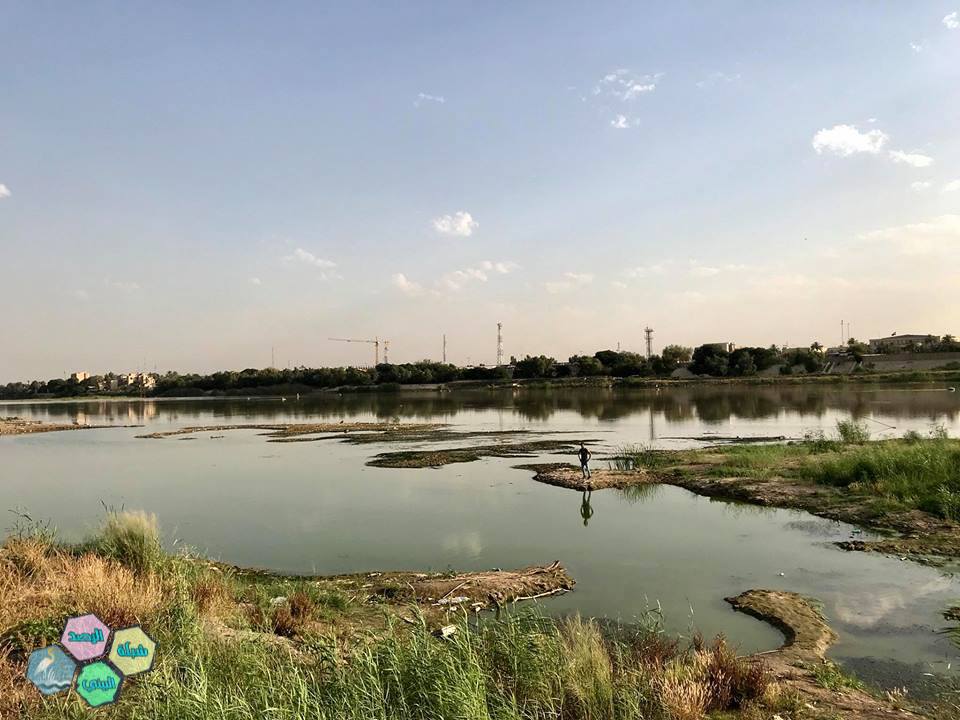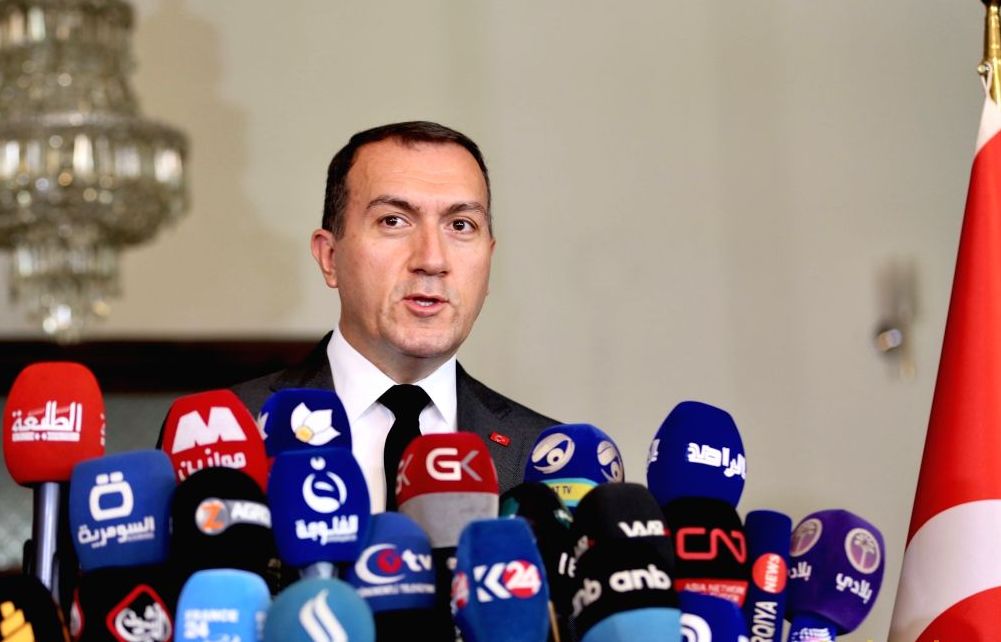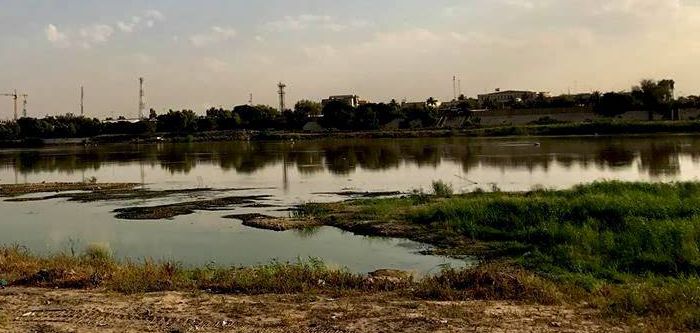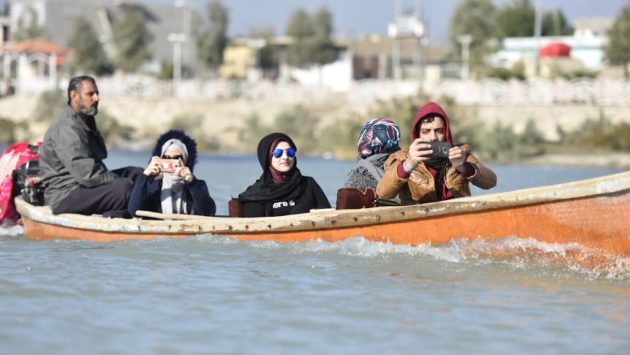As Summer Approaches and Ilisu Dam Goes Into Operation, Iraq’s Water Crisis Intensifies
“Significant quantities of water will continue to flow to Iraq,” the ambassador of Turkey to Iraq, Fatih Yildiz, tried to reassured Iraqis on Tuesday. Over the course of last week, the Tigris River saw an alarming reduction in water levels across the country, and this was blamed on Turkish dam construction upstream. Fearing a major drought, Iraqis panicked across social media. In the capital Baghdad, people were able to cross the Tigris river by foot. According to Riyadh Ezadin, Director of the Mosul Dam, the amount of water coming from Turkey had decreased by 50 percent. Media reported this was the effect of Ilisu Dam which recently finished construction and is now set to start operating.
An emergency session was held on June 3 in the Iraqi parliament to discuss the ongoing water crisis. “The water shortage we have in Iraq today is beyond the national borders,” parliament speaker Salim Al-Jabouri said. Ilisu Dam is set to be officially inaugurated by President Erdogan this month. Iraq requested a 3-month postponement last June. Now, once again, an Iraqi political delegation visiting Ankara is requesting the postponement of the dam launch. However, Erdogan stated that on Sunday that there is no turning back on the construction of the dam. “We told Iraq 10 years ago to store water and build dams for their country and people but its leaders have done nothing” he expressed. Erdogan claims water will be released when the dam reservoir is filled. Turkey refuses to regard the Tigris and Euphrates as international rivers, shared by Syria and Iraq. Iraqi MPs claim the country’s water resources are being stolen from them and have called to take negotiations to the highest level in Turkey (President Erdogan), or the United Nations. Ahmed Al-Jabouri, member of Iraq’s Parliamentary Committee on Foreign Relations, warned of future water wars, pointing to the regional magnitude of the crisis.

“Though current water troubles have been attributed to Ilisu Dam, the actual storing will start only in a few months”, says Ercan Ayboga of the Mesopotamian Ecology Movement. “Impounding of a dam usually starts in the winter, not during summer. Currently only one of three valves for water-storing operations have been closed”. The Ministry of Forest and Water Management in Turkey explained on June 5 the country was only “partially” filling the reservoir by closing one of the valves on the first of three diversion tunnels.
Experts have pointed out that Iraq is set to have an arid summer this year due to high temperature and high evaporation rates, which will affect irrigation water for agriculture and mostly impact the Southern part of the country which includes the Iraqi Marshlands. Climate change is intensifying across the region. “There was little snowfall this winter. The past month there was a lot of rainfall, but little of this water has been stored,” Ercan Ayboga says. The weather is extremely volatile, with irregular patterns of snow and rainfall. “May and June is not the usual time to store water, but the Kurdistan Region of Iraq in the north could do it, in order to save water especially with the prospect of Ilisu Dam coming into operation.”
MP Ahmed Al-Jabouri says local measurements are necessary. Iraq relies on traditional methods which waste large quantities of water, while the country’s lack of water reservoirs exacerbates the crisis. Last February Maysan Governorate in Southern Iraq suffered from drought and there were no internal water reservoirs to fall back on. Officials in the Kurdistan Region have admitted there is a water management problem, with water not being adequately stored and conserved.

Hasan Al-Janabi, Iraq’s Water Resources Minister, says similar crises erupted in the 1990s, but noted that the real effects of Ilisu Dam are still to be felt once it begins its actual operation. The Minister warned last year of a possible water crisis, urging citizens to reduce their water consumption. Now, with climate change and upstream dams coming into full effect, Iraq could face a continued drought leading to to an internal crisis affecting hydro-electric electricity supply and agriculture. Earlier this year, tribal conflicts erupted in the Southern provinces over agricultural water quotas. The Marshlands, UNESCO World Heritage in Southern Iraq, could be severely affected if water flows are reduced.
To contain the water crisis, the Iraqi government needs to establish water-sharing agreements with its neighbors. Turkey refuses to ratify a 1997 UN Convention on the sharing of international waterways and considers to have full sovereignty over the upstream Tigris and Euphrates Rivers. The complexity of the situation is exacerbated by Iran, which has constructed a series of dams and diverted the water flows of Tigris River tributaries. On June 2 the Iraq-Kurdish bordertown of Qaladze reported 80% of the water flows of the Little Zab River were cut by the Sardasht Dam in Iran. This happened last year as well, leading to protests in front of the Iranian consulate in Sulaymaniyah. Experts have warned water levels at Lake Dukan and Lake Darbandikhan will drop due to Iranian dams, and in Southern Iraq, Hawiza Marsh has been affected for years by man-made embankments on the Iranian side.
Shia cleric Muqtada al-Sadr, whose Sairoon alliance won the elections, has demanded that the government urgently addresses the crisis. To reach a long-term solution, Iraq will have to regain its soft power and respond with strong water diplomacy vis-à-vis its neighbors. The next Iraqi government will have to take on the challenge to safe the two great rivers of Iraq.
By Toon Bijnens, Save the Tigris and Iraqi Marshes Campaign




